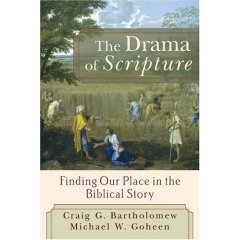
“The Drama of Scripture: Finding Our Place in the Biblical Story” by Craig Bartholomew and Michael Goheen is probably the best book I have read all year. In Bartholomew and Goheen’s book, it sets out to help Christians find their purpose within the larger biblical story by organizing the story into a six-act structure:
Act 1: God Establishes His Kingdom: Creation
Act 2: Rebellion in the Kingdom: Fall
Act 3: The King Chooses
Scene 1 A People for the King
Scene 2 A Land for His People
Interlude: A Kingdom Story Waiting for Ending: The Intertestamental Period
Act 4: The Coming of the King: Redemption Accomplished
Act 5: Spreading the News of the King: The
Scene 1 From
Scene 2 And into All the World
Act 6: The Return of the King: Redemption Completed [1]
Not only is this book helpful through it’s six-act structure, in my opinion, it also seems to be making the right emphasis within the larger biblical story. The authors states their 3 emphases as:
1. Comprehensive scope of God’s redemptive work in creation.
“First, we stress the comprehensive scope of God’s redemptive work in creation. The biblical story does not move toward the destruction of the world and our own “rescue” to heaven. Instead, it culminates in the restoration of the entire creation to its original goodness.” [2]
2. The believer’s own place within the biblical story.
“Second, we emphasize the believer’s own place within the biblical story. Some refer to four questions as foundational to a biblical worldview: “Who am I?” “Where am I?” “What’s wrong?” “What’s the solution?” Tom Wright adds an important fifth question: “What time is it?”…As part of our telling of the Bible’s grand story, we will explore the biblical answers to these five questions. [2]
3. Centrality of
“Third, we highlight the centrality of mission within the biblical story. The Bible narrates God’s mission to restore the creation.
[1] pg. 27
[2] pg.12-13

No comments:
Post a Comment